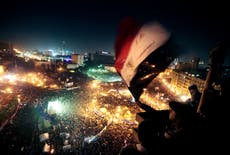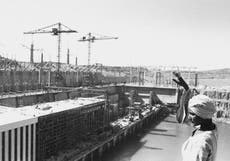The issues behind Egypt’s 2011 revolution have not vanished – they now define this era around the world
What inspired the 25 January revolution still has a lot to tell us all


Your support helps us to tell the story
From reproductive rights to climate change to Big Tech, The Independent is on the ground when the story is developing. Whether it's investigating the financials of Elon Musk's pro-Trump PAC or producing our latest documentary, 'The A Word', which shines a light on the American women fighting for reproductive rights, we know how important it is to parse out the facts from the messaging.
At such a critical moment in US history, we need reporters on the ground. Your donation allows us to keep sending journalists to speak to both sides of the story.
The Independent is trusted by Americans across the entire political spectrum. And unlike many other quality news outlets, we choose not to lock Americans out of our reporting and analysis with paywalls. We believe quality journalism should be available to everyone, paid for by those who can afford it.
Your support makes all the difference.It has been 10 years since events in Egypt began that changed my life and altered the course of history. While part of me is entwined in the complexity of everything that has happened since, both in Egypt and across the world, it remains the case that I hold the revolutionary energy that was unleashed in that moment as a lodestar.
What happened on 25 January 2011 and the 18 days that followed reoriented our sense of possibility. It made the world we wanted seem a tangible reality, and Tahrir Square became a symbol that made the fire lit by the toppling of Tunisia’s president Ben Ali seem unstoppable. The “people demand the downfall of the regime” became the rallying call for the region, as country after country fought to change their destinies, in turn inspiring the “Occupy” movement, and the various anti-austerity movements of Europe. The world was changing and we were the people we had been waiting for to make it happen.
Revolutionary moments do not only change the world around you, they alter your relationship with yourself and everyone you know. The truth is that I am tethered to the experience of that moment, and probably always will be. It lives with me in the intimacy of my smallest decisions. It also informs my reading of the world – and the extraordinary convulsions we have seen shape these last 10 years in every country on earth.
At its simplest level, what we were fighting in Egypt was the injustice of extreme global inequality – and the structure of how it is maintained. Hosni Mubarak was not the cruellest of dictators, but the Egypt he presided over was – and remains – a brutally grotesque archetype of the conditions under which many people live all over the world.
It is a world in which the poor live a life completely detached from the rich, in which the young feel they have no future, and in which all the provisions of a functioning state are collapsing, from healthcare to education, social security and housing. It is a world in which the only solution governments seem to offer relies on increasingly unaccountable corporate power to drive growth, with little or no regard for the environmental cost. And then when all this doesn’t work… police the unrest that follows when people rightly demand a life of dignity.
Bread. Freedom. Social justice. These were the words, chanted by millions in Egypt to define what bringing down the regime meant.
The difference between Egypt and so much of the rest of the world, then and now, is that the unbearable nature of what you are told you have to accept as normal is extreme on every level. And so the way it has to be contained is extreme in equal measure. Since Abdel Fattah al-Sisi came to power in 2014, at least 19 new prisons have been built. There are estimated to be more than 60,000 political prisoners across the country.
Egypt ranks amongst the most repressive regimes in the world on the level of civil liberties, political rights and the application of the death penalty. Not only are political activists and journalists intimidated and imprisoned, but filmmakers, actors, translators, even doctors demanding basic PPE to be able to treat Covid-19 patients. And while the IMF lauds Egypt’s macroeconomic indicators, the structural adjustment programme implemented as a condition of receiving a $12bn loan have meant austerity measures.
Those measures have hit the poor and middle classes with skyrocketing costs for the basic provisions of life. Meanwhile, the Sisi regime is building a new capital city of gated compounds and skyscrapers in the desert, rather than investing in the myriad ways it could to ensure a better life for Egypt’s poor.
The thing I believe we often forget about revolutions is that, beautiful as they are at the moment of hopeful rupture, they are signs of deep and chronic failure. At the simplest level, the lives of the majority – who are always its poorest – needs to be bearable. And if it isn’t truly bearable, the awfulness of a cruel, grinding life can be accepted when you know it’s the price being paid for a better life for your children or, failing that, your grandchildren. When you know with absolute clarity that your children’s life will be worse than yours, and even your grandchildren’s children will be just as bad, if not worse, the social contract underpinning stability begins to falter.
The question we face today in Egypt is not whether things were better under Mubarak, or creating any yardstick to measure the revolution’s success or failure. It is to ask the question of whether the chronic problems Egypt faces are truly being addressed, and if not why, and what this means we have to do to create a more hopeful future.
It remains clear that however vague the demands of the 25 January revolution might have been, the future it augured was better than this one. And so it’s no surprise that the full force of counter-revolutionary retrenchment has come to try and suffocate its energies. The question is, can the full force of oppression ever be enough to stifle the march of justice?
Did 25 January 2011 mark the beginning of the end of the fight for equality? Of course not. But look at the revolutions of history, and the long arc of struggles for justice and liberty. Part of what defines them is a struggle with the linearity of our expectations, and hopes for how we’d like them to have been. Look at the journey in Europe from 1789 to 1848 and the Paris commune of 1870. Look at the legacy of those generations and how they fed 1905 in Russia and then 1917, 12 years later. The American revolution alone is considered to have lasted 18 years. Look at the march for universal suffrage and women’s rights. The fight for trade unionism. Look at the long journey to end slavery and colonialism, and how they echo in Black Lives Matter and everything that’s ahead of us.
Then look at the absurdity of the question that claws at all of us – “Yes, but was worth it?” As if what is needed is some kind of rolling speculative cost-benefit analysis of the situation. Would that have been a useful question to ask of any of these historical movements as they were in process? The journey fighting for necessary change is horribly messy and full of disappointments. It brings out the best in human nature and the very worst.
If I could go back in time and tell myself and anyone about to live through 2011 one thing, it would be to have expected worse, and an even more difficult journey than the one we’ve had. The reason for this is that necessary struggles require a fortitude of spirit and solidarity that is inhuman, such is the viciousness with which it is fought by those in power. That is the reason it cuts across generations. And had we known how hard this would be, we might have taken less for granted at key moments. But to be honest, I’m not interested in hindsight.
Because really, what I’m telling you – wherever you are – is that what was unleashed in Egypt and elsewhere in 2011 is still echoing in your present. The social, political and economic issues that underpin what caused the 25 January revolution are the issues that define our era across the world. It is the neoliberal political order.
The best thing we can do is understand it and fight it on our home ground, because just as an injury to one is an injury to all, each gain made is an inspiration. And as the ferment of this decade has taken us through the highs of 2011 to the lows of right-wing populism, we start these next 10 years in a place where even our closest relationships are tied to how we deal with the causes of collapsing biodiversity.
There is hope, particularly if we listen to the call of 2011. In democracies that are still able to function, albeit threatened, we have to insist on the most ambitious reforms possible. And in countries like Egypt, in which all the avenues of accountability are currently closed, we have to keep alive what we can, in the knowledge that tyranny always ends, and justice will come.
Khalid Abdalla is a British-Egyptian actor and activist



Join our commenting forum
Join thought-provoking conversations, follow other Independent readers and see their replies
Comments